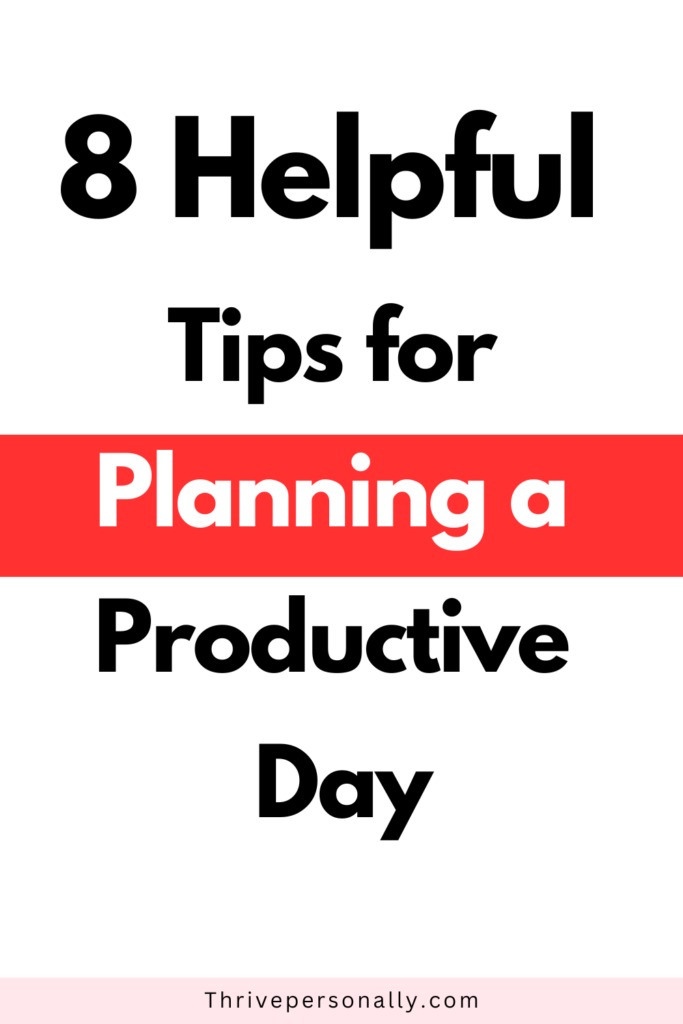Planning your day is a crucial step toward achieving a productive lifestyle. When you take the time to organize your tasks and manage your schedule, you create a framework that helps you navigate through the challenges of daily life. A well-planned day allows you to allocate your time effectively, ensuring that you focus on the most important activities that contribute to your overall goals.
Many people underestimate the power of a structured day. Without a plan, it’s easy to feel overwhelmed by the demands of work, family, and personal commitments. By planning your day, you not only reduce stress but also gain control over your time.
This control can lead to a greater sense of accomplishment as you check off completed tasks. When you know what you need to do and when, you can work more efficiently, leading to less wasted time and energy.
8 Helpful Tips for Planning a Productive Day
1. Set Clear Goals
Setting clear goals is a fundamental aspect of planning a productive day. When you envision what you want to accomplish, it becomes easier to focus your efforts. Start by identifying your most important tasks for the day. Ask yourself what needs to be completed and what you would like to achieve by the end of the day. This exercise helps in establishing a clear intention for your workflow.
Once you have a list of tasks, break them down into smaller, manageable steps. For example, instead of writing “clean the house,” specify tasks like “vacuum the living room” or “dust the shelves.” By dividing larger tasks into smaller steps, you reduce the overwhelming feeling that often accompanies big goals. This method will allow you to tackle them more effectively, step by step, making your day feel more structured.
Read Also: 7 Steps to Create an Achievable Personal Development Plan
2. Create a Schedule

Creating a schedule is an essential step in planning a productive day. A structured schedule can help you manage your time effectively, allowing you to meet your daily goals with ease. One of the popular methods you might consider is time blocking.
This technique involves dividing your day into blocks of time, each dedicated to a specific task or type of activity. By doing so, you minimize distractions and ensure that you stay focused on one thing at a time. This clear allocation of time makes it easier for you to track your achievements throughout the day.
3. Limit Distractions
To ensure a productive day, it is crucial to identify and limit distractions that may hinder your focus and efficiency. The first step is recognizing the factors that divert your attention. This may include notifications from your phone, email alerts, or even background noise. You can take simple but effective measures to minimize these disruptions.
One effective strategy is to turn off notifications on your devices. Doing this can significantly reduce interruptions throughout the day. Consider enabling “Do Not Disturb” mode when you are working on tasks that require deep concentration. By removing these digital distractions, you create a more conducive environment for productivity.
Additionally, finding a quiet workspace can greatly enhance your ability to focus. If working from home, select an area that is free from constant foot traffic and noise. You may also want to create a designated workspace that signals to others that you are not to be disturbed. This can help you maintain your focus and set the tone for a productive day.
Read Also: 8 Daily Goals to Make Your Life Better
4. Take Breaks
Taking breaks is an essential strategy for maintaining your focus and energy levels throughout the day. When you engage in continuous work without pausing, you may find that your concentration wanes and your productivity declines. This can lead to burnout, making it challenging to accomplish your tasks effectively. By incorporating breaks into your daily schedule, you can rejuvenate your mind and body, enhancing your overall efficiency.
There are two main types of breaks you should consider: short breaks and longer breaks. Short breaks, which typically last around 5 to 15 minutes, can be taken after every 25 to 50 minutes of focused work. During these breaks, you can stand up, stretch, or even take a brief walk. This helps stimulate blood circulation and allows your brain a moment to process information quietly. You may also use this time to grab a healthy snack or hydrate, which can significantly boost your energy.
On the other hand, longer breaks are usually scheduled into your day bi-hourly or after several hours of work—lasting anywhere from 30 minutes to an hour. These breaks allow you to step away from your tasks completely. You might want to head outside for some fresh air or engage in a fun activity that distracts your mind from work. This method can help to reset your focus and creativity for the tasks that lie ahead.
5. Stay Flexible
When you set out to plan a productive day, it’s crucial to remember that flexibility is key to success. Life is unpredictable; you may encounter unexpected changes or challenges that could derail your carefully crafted schedule. Instead of viewing these interruptions as setbacks, approach them with an open mind and a willingness to adapt. This mindset allows you to remain productive, even when things don’t go according to plan.
One effective strategy for maintaining flexibility is to allocate buffer time in your schedule. By planning short breaks between tasks or meetings, you create space to manage unforeseen circumstances without feeling overwhelmed. For example, if a project takes longer than expected, having that buffer time can prevent you from falling behind on your other commitments. Remember that it is okay to adjust your tasks as necessary. You can shift priorities based on urgent needs or deadlines, ensuring you focus on what truly matters.
6. Reflect on Your Day
At the end of each day, taking a moment to reflect on what you accomplished can significantly impact your productivity. This practice allows you to review the tasks you completed and identify areas where you struggled. By understanding these aspects, you can make necessary adjustments to improve your productivity in the future.
Start by reviewing the list of tasks you set for yourself at the beginning of the day. Did you complete everything you aimed for? If so, celebrate this achievement. Recognizing your accomplishments, no matter how small, can boost your motivation and confidence. If you find that certain tasks remained unfinished, take note of them and consider the reasons why. Were they too ambitious, or did unexpected distractions arise?
After evaluating your successes and challenges, ponder over strategies to overcome obstacles in the future. For example, if you consistently find that you get distracted by your phone, you may want to set specific times for checking messages. Alternatively, consider creating a more structured schedule that allows for more focused work periods.
7. Prioritize Sleep and Self-Care

To ensure that your day is productive, you must prioritize sleep and self-care. These elements are often overlooked yet are essential for enhancing both your mental and physical performance. Studies indicate that individuals who get sufficient sleep are more focused, alert, and creative. Conversely, chronic sleep deprivation can lead to decreased performance and cognitive decline, making it vital to establish a healthy sleep routine.
Firstly, aim for 7 to 9 hours of quality sleep each night. To improve your sleep, develop a consistent bedtime routine. This could involve activities such as reading, meditating, or taking a warm bath before sleep. You should also ensure your sleeping environment is comfortable, dark, and quiet. This will help you fall asleep faster and enjoy a deeper rest.
Nutrition plays a significant role in your daily productivity as well. Incorporating a balanced diet rich in fruits, vegetables, lean proteins, and whole grains can fuel your body, giving you lasting energy throughout the day. Try to avoid foods high in sugar and caffeine, especially close to bedtime, as these can disrupt your sleep patterns.
8. Use Tools and Apps
One of the most popular categories of productivity tools is task management apps. These applications, such as Todoist, Asana, or Trello, allow you to create, assign, and categorize tasks. By breaking down your day into manageable parts, you can prioritize what needs to be done first and stay on top of your workload. Many of these apps also include features for setting deadlines and reminders, which can ensure that you don’t overlook important tasks.
Digital calendars have also emerged as essential tools for planning your daily activities. Google Calendar, for example, allows you to schedule appointments, set events, and even share your calendar with others. This feature can be especially useful when coordinating group meetings or ensuring that family members are aware of each other’s schedules. You can customize notifications to remind you of upcoming events, enabling you to allocate your time more effectively.
In addition to planners and task management apps, there are note-taking applications, such as Evernote and OneNote, that can help you capture ideas and organize your thoughts. These platforms provide a space where you can store important information, whether it pertains to work, personal projects, or daily reflections. Utilizing these tools can enhance your ability to plan a productive day, as they keep all your information and tasks in one accessible location.
Read Also: Looking for a Stress-Free Year? Try These 20 Must-Have Apps
Conclusion
Begin by establishing a clear vision of what you want to accomplish each day. Setting specific, achievable objectives allows you to stay focused and motivated. Additionally, prioritize your tasks based on their importance and deadlines. This helps ensure that you tackle the most critical items first, allowing you to maintain momentum as you progress through the day.
Another essential factor is creating a structured schedule. Allocate specific time blocks for each task, incorporating breaks to recharge your energy. When you have a plan in place, you are more likely to follow through and avoid distractions that can derail your productivity. It can also be helpful to review your completed tasks at the end of the day, as this reflection reinforces your accomplishments and prepares you for the next day.
Implementing these tips will require commitment and consistency on your part, but the benefits are undeniable. You will not only become more efficient in your work but also find more time for personal pursuits and relaxation. Taking the first step by applying these strategies will ignite a positive change in your daily routine. So, embrace the opportunity to transform your days into productive ones and watch how this simple shift can improve your overall well-being. Start today, and witness the difference it makes in your life.
Save the pin for later



